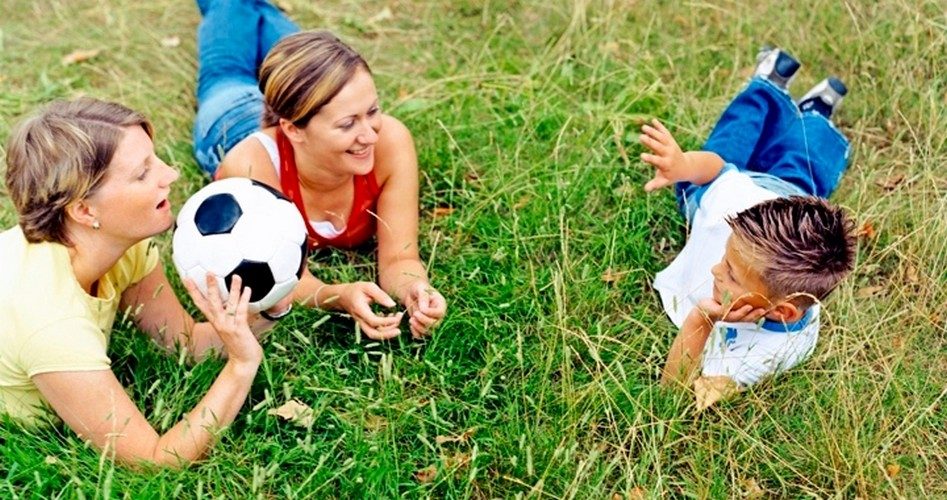
A pair of academic studies is raising a challenge to the notion that children raised by “gay” parents fare as well as kids raised in traditional homes with a mother and father. One of the studies, led by University of Texas sociology professor Mark Regnerus, surveyed nearly 3,000 U.S. adults, ages 18 through 39, measuring their past and present lives relative to 40 social, emotional, and relationship outcomes. The survey included “questions about factors such as income, relationship stability, mental health, and history of sexual abuse,” reported ABC News. Of the approximately 3,000 participants, 73 said that their father had engaged in a homosexual relationship, with 163 reporting that their mother had had such a relationship.
“People who reported that their mother or father had a same-sex relationship at some point were different than children raised by their biological, still-married parents in 25 of the study’s 40 measures,” reported ABC News of the study, published in the journal Social Science Research. “And most of the time, they fared worse. The children of parents who at some point had a same-sex partner were more likely to be on welfare, have a history of depression, have less education, and report a history of sexual abuse, the study found.”
Regnerus, who helped to develop the New Family Structures Study at the University of Texas, said the findings of the study challenge the insistence that there is little difference between the parenting outcomes of homosexual couples and those of a traditionally married man and woman. In the study he wrote that “children appear most apt to succeed well as adults when they spend their entire childhood with their married mother and father, and especially when the parents remain married to the present day.”
The Washington Times reported on a second study, also published in Social Science Research, that makes a critical analysis of a positive report on “gay” parenting by the American Psychological Association (APA). According to a brief of the APA report, “Not a single study has found children of lesbian or gay parents to be disadvantaged in any significant respect relative to children of heterosexual parents.”
But after analyzing 59 studies upon which the popular APA report is based, Loren Marks, an associate professor at the School of Human Ecology at Louisiana State University, came to the conclusion that the “jury is still out” on the APA assertion. “The lack of high-quality data leaves the most significant questions [about gay parenting] unaddressed and unanswered.”
According to the Washington Times, “Problems with the APA-cited studies were their small size; dependence on wealthy, white, well-educated lesbian mothers; and failure to examine common outcomes for children, such as their education, employment and risks for poverty, criminality, early childbearing, substance abuse and suicide. Instead, the APA studies often looked at children’s gender-role behaviors, emotional functioning, and sexual identities.”
Jennifer Chrisler, executive director of the pro-homosexual Family Equality Council, “declined to comment on the studies, which she had not seen,” reported the Times. “But she was confident they could not counteract ‘the very deep and rich body of research that has been conducted over the last 30 years’ that shows children raised by gay, bisexual, and transgender parents ‘do equally as well as their counterparts raised by heterosexual couples.’”
Chrisler, who is raising two boys with her lesbian partner, added that “I can tell you anecdotally that, given the thousands and thousands of families that I spend time with on a regular basis, [what happens in their lives] bears out and confirms everything that we see in the research, in terms of the positive outcomes for these kids.”
Chrisler’s comments, however, tend to reinforce the flaws of most of the studies that affirm “gay” parenting — namely that the participants in such studies are often recruited from the same closed community of homosexual friends and colleagues in which the researchers themselves move.
Regnerus insisted that his study was not intended to denigrate “gay” parenting, but was instead meant to identify possible differences between the parenting outcomes of homosexual and traditional parents. “I’m not claiming that gay and lesbian adults are bad parents,” he told ABC News. “This is not a parenting study,” Regnerus said. “What this shows is that there’s lots of diversity.”
Nonetheless said Patrick Fagan, director of the Marriage and Religion Institute at the conservative Family Research Council, Regnerus’ research represents the most comprehensive findings about the marked differences between same-sex and traditional parents, and serves to highlight the instability children face in homes parented by homosexual couples. “The instability of the coupling is the really big finding that I think is debate-altering,” Fagan told ABC News.
National Review’s Charles Cooke noted that Regnerus, who insisted that his study reflected no political motivation, found that “children with a parent in a same-sex relationship ‘underperform’ in almost every category,” with one finding particularly troubling: “Less than 2 percent of children from intact, biological families reported experiencing sexual abuse of some nature, but that figure for children of same-sex couples is 23 percent.” Equally troubling, noted Cooke of Regnerus’ research, is that “14 percent of children from same-sex couples have spent some time in foster care, compared with around 2 percent of the American population at large. Arrest, drug experimentation, and unemployment rates were all higher among children from same-sex families.”
Cooke wrote that the success of Regnerus’ research lies in its answer to the question of “whether children raised by same-sex couples end up differently: Clearly they do, and it does not require a conservative viewpoint to see that ‘differently’ very often means ‘worse.’”
Whether that answer amounts to an indictment of same-sex households or the instability that is bred in a majority of them is open to debate. Ultimately, Cooke pointed out, “the major takeaway from the report is less an indictment that same-sex households are a negative thing and more an affirmation that intact, biological households are a positive thing. Put simply, if you want to give your children the best start in life, you should have children inside of wedlock and stay together for the duration. But then, we already knew that.”



